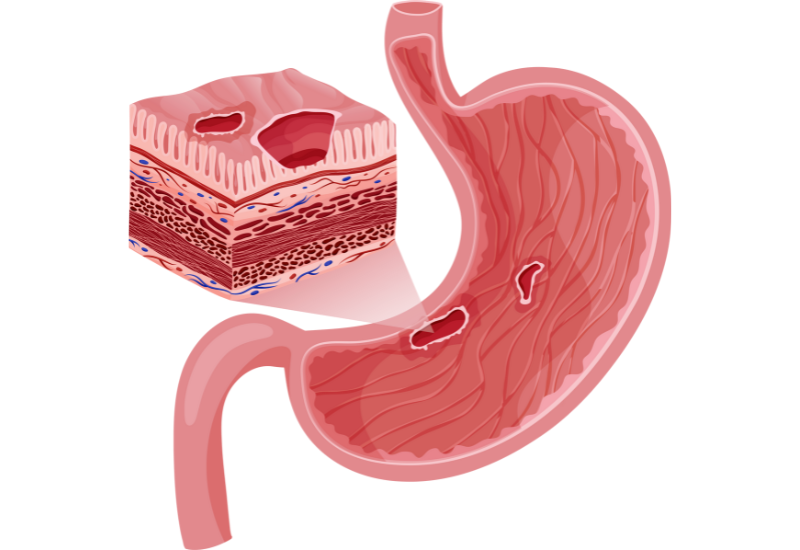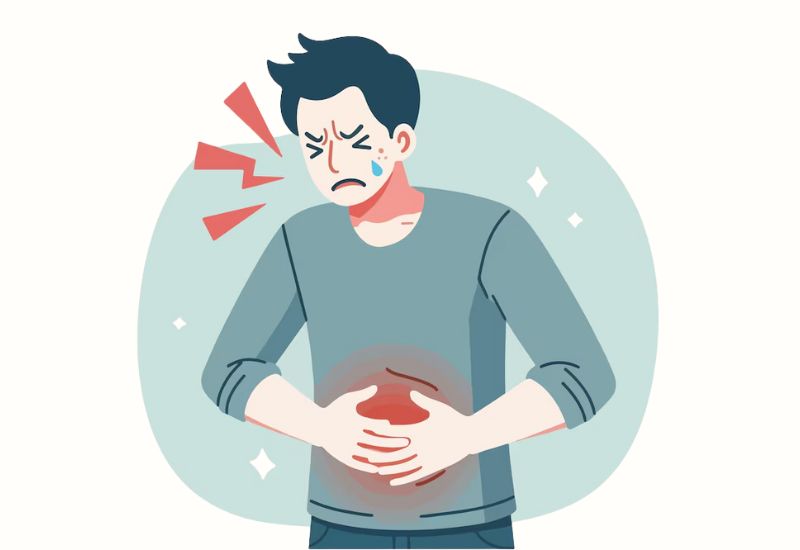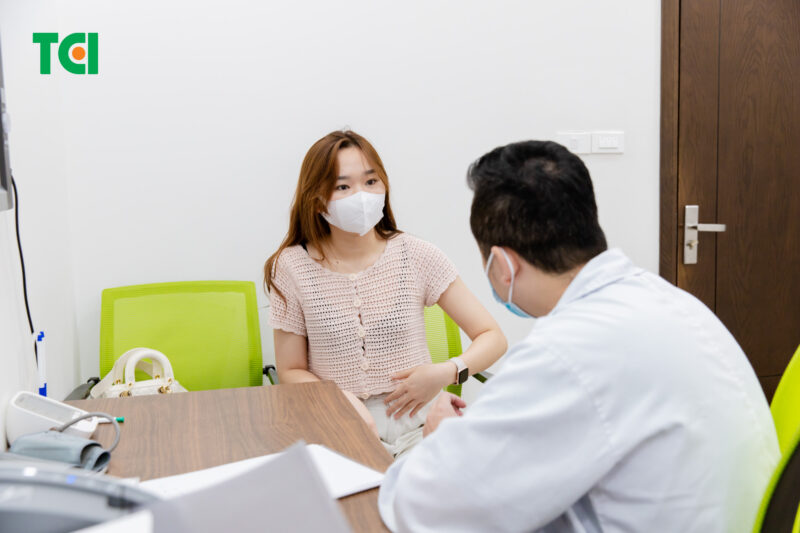Understanding the symptoms of peptic ulcer disease is essential for early diagnosis and timely treatment to prevent dangerous complications. This article aims to provide comprehensive and professional information on this gastrointestinal condition.
1. What is Peptic Ulcer Disease?
Peptic ulcer disease refers to the development of ulcers and inflammation on the mucosal lining of the stomach or duodenum, and in some cases, the ulcers may penetrate deeper into the muscle layers of the gastrointestinal tract. It is one of the most common digestive diseases, affecting nearly 30% of Vietnam’s population.

Peptic ulcer disease is a common gastrointestinal condition.
2. Most Common Symptoms of Peptic Ulcer Disease
2.1. Persistent Abdominal Pain – A Typical Early Sign
In its early stages, symptoms of peptic ulcer disease may not be easily recognizable. However, one of the initial and most frequent symptoms is a dull, aching pain in the upper abdomen, particularly around the stomach and small intestine. This pain often persists for hours and may recur over several days. It is crucial not to overlook this symptom—early medical intervention can prevent complications and lead to full recovery.
2.2. Other Recognizable Symptoms
– Bloating, Indigestion, and Nausea: Excess acid production caused by ulcers often leads to acid reflux, making patients feel nauseous, bloated, and unable to digest food properly. Appetite loss is also common.
– Pain in the Epigastric Region: Many patients report a dull, persistent pain above the navel, which tends to worsen when the stomach is empty or when sitting in a hunched position.
– Frequent Belching and Heartburn: These are classic symptoms of peptic ulcer disease and are especially common during the early phases of the condition.
– Digestive Irregularities: Symptoms such as diarrhea and constipation may occur.
– Disturbed Sleep: Bloating and abdominal discomfort often interfere with restful sleep, causing frequent nighttime awakenings.

Symptoms of peptic ulcer disease include dull abdominal pain, epigastric pain, digestive issues, bloating, and heartburn.
3. Causes of Peptic Ulcers
– Helicobacter pylori (H. pylori) Infection: This is the leading cause of peptic ulcer symptoms. H. pylori is a bacteria that colonizes the digestive tract and is commonly transmitted through contaminated food, water, or utensils. Around 70% of Vietnamese people carry this bacteria, although not all develop ulcers. Individuals with poor diets, high stress levels, alcohol consumption, or smoking are at higher risk.
– Poor Dietary Habits: Frequent consumption of spicy foods, fried or greasy dishes, skipping breakfast, eating late at night, overeating, or eating too quickly can all contribute to the development of ulcers.
– Unhealthy Lifestyle Patterns: Staying up late, insufficient sleep, lack of physical activity, and dehydration weaken the digestive system.
– Medication Overuse: Excessive use of NSAIDs (pain relievers) and certain antibiotics can damage the stomach lining.
– Chronic Stress: Long-term emotional stress is also a significant contributor to the development and recurrence of ulcers.
4. Potential Complications to Be Aware Of
If left untreated, peptic ulcer disease can lead to severe complications:
– Gastrointestinal Bleeding: This may present as black or bloody stools or vomiting blood. Severe bleeding can be life-threatening and requires urgent medical attention.
– Perforation: Ulcers may erode completely through the stomach or duodenal wall, resulting in leakage of gastric contents into the abdominal cavity—this causes peritonitis and sepsis, which can be fatal.
– Stomach Cancer: Long-standing H. pylori-related ulcers significantly increase the risk of gastric cancer.
5. Current Treatments for Peptic Ulcer Disease
The primary goal of treating peptic ulcer disease is to eliminate the underlying cause, promote ulcer healing, and prevent recurrence. Effective treatment involves:
Medical Therapy: Patients should consult healthcare professionals for appropriate diagnostic tests and individualized treatment plans, which may include antibiotics to eradicate H. pylori and acid-suppressing medications. Self-medication is strongly discouraged, as improper drug use can worsen the condition.

Peptic ulcer treatment must strictly follow the specialist’s prescribed regimen.
Lifestyle and Dietary Adjustments:
– Eat a balanced diet rich in fiber, fresh fruits, vegetables, whole grains, and lean protein.
– Avoid skipping meals or overeating. Eat small, frequent meals throughout the day.
– Limit intake of red meat, processed foods, spicy dishes, and fermented or pickled foods.
– Stay physically active and maintain a healthy weight.
– Avoid smoking and reduce alcohol consumption.
– Manage stress through relaxation techniques and adequate rest.
Recognizing and addressing symptoms of peptic ulcer disease promptly is essential to avoid serious health outcomes. If you experience any of the symptoms mentioned above, seek evaluation at a specialized medical facility. Early diagnosis and treatment not only ensure better recovery but also significantly reduce the risk of complications.








